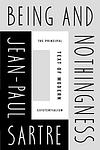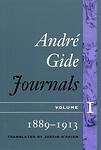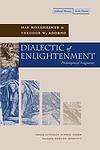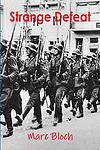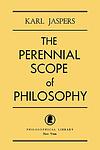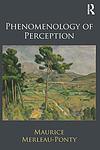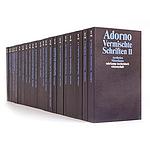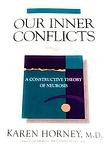The Greatest Greek, German, French "Nonfiction" Books From 1940 to 1949
Click to learn how this list is calculated.
This list represents a comprehensive and trusted collection of the greatest books. Developed through a specialized algorithm, it brings together 305 'best of' book lists to form a definitive guide to the world's most acclaimed books. For those interested in how these books are chosen, additional details can be found on the rankings page.
Genres
Countries
Date Range
Reading Statistics
Click the button below to see how many of these books you've read!
Download
If you're interested in downloading this list as a CSV file for use in a spreadsheet application, you can easily do so by clicking the button below. Please note that to ensure a manageable file size and faster download, the CSV will include details for only the first 500 books.
Download-
1. The Second Sex by Simone de Beauvoir
This influential work explores the treatment and perception of women throughout history, arguing that women have been repressed and defined only in relation to men. The author presents a detailed analysis of women's roles in society, family, work, and in the creation of their own identities. She discusses the concept of 'the other' and how this has been used to suppress women, while also examining the biological, psychological, and societal impacts of this oppression. The book is a seminal text in feminist theory, challenging traditional notions of femininity and calling for equality and freedom for women.
The 121st Greatest Book of All Time -
2. The Myth of Sisyphus by Albert Camus
This book is a philosophical essay that explores the concept of absurdity, and how individuals should respond to life's inherent meaninglessness. It posits that life is essentially absurd due to the conflict between our desire for understanding and the chaotic, indifferent universe. The author argues that the only proper response to this absurdity is to live life to its fullest, embracing and rebelling against the absurdity, rather than resorting to suicide or turning to religion or philosophy for false comfort. The story of Sisyphus, condemned to eternally roll a boulder up a hill only for it to roll back down, is used as a metaphor for the human condition.
The 585th Greatest Book of All Time -
3. Being and Nothingness by Jean Paul Sartre
This philosophical work delves into the concept of existentialism and phenomenology, offering an in-depth analysis of human consciousness and existence. The author argues that we are all essentially free and responsible for our actions, and that we construct our own identities through our actions and interactions with others. The book also explores the idea of 'nothingness' and 'bad faith', suggesting that we often deny our freedom and hide from the responsibility of our actions, leading to a life of inauthenticity.
The 633rd Greatest Book of All Time -
4. The Mediterranean And The Mediterranean World In The Age Of Philip Ii by Fernand Braudel
This seminal work offers a comprehensive analysis of the Mediterranean region during the 16th century, focusing on the complex social, political, and economic landscapes that defined the era of Philip II of Spain. The book transcends traditional historiography by emphasizing the geographical and ecological factors that shaped human activity, from the ebb and flow of commerce and the patterns of agrarian life to the rise and fall of empires. Through a meticulous study of the Mediterranean world, the narrative weaves together the intricate tapestry of cultures, religions, and power dynamics that characterized the period, providing a vivid portrayal of the enduring influence of the environment on the course of human history.
The 1126th Greatest Book of All Time -
5. Journals: 1889-1913 by André Gide
"Journals: 1889-1913" is a compilation of personal entries by a prominent French author, written over a span of 24 years. The journals offer a deep insight into the author's thoughts, emotions, and experiences, providing a unique window into his personal life and his creative process. The entries also reflect on the social, political, and cultural events of the time, making the journals not only a personal memoir but also a historical document of late 19th and early 20th century France.
The 1410th Greatest Book of All Time -
6. The Fear Of Freedom by Erich Fromm
The book explores the psychological and societal mechanisms that lead individuals to relinquish their autonomy and seek security in authoritarian systems, despite the inherent dangers of such a surrender. It delves into the historical context of the 20th century, particularly the rise of fascism and totalitarianism, to understand the paradoxical inclination of people to escape freedom's responsibilities. The author argues that true freedom requires not only the absence of external constraints but also the presence of inner psychological conditions that enable self-reliance, critical thinking, and the ability to love and connect with others. The work challenges readers to confront the difficult task of achieving positive freedom through self-awareness and the development of one's human potential.
The 1924th Greatest Book of All Time -
7. Dialectic Of Enlightenment by Max Horkheimer, Theodor Adorno
"Dialectic of Enlightenment" is a seminal philosophical work that explores the nature of enlightenment and its paradoxical relationship with the concept of reason. The authors argue that the Enlightenment's quest for knowledge, freedom, and autonomy has inadvertently led to the opposite: a form of domination and control through instrumental reason. They examine how the Enlightenment's rationality, once aimed at liberating individuals from myth and superstition, has devolved into a tool of oppression, giving rise to totalitarian systems and a culture industry that manipulates mass society. The book delves into various cultural artifacts, including literature, film, and popular culture, to illustrate how enlightenment has become self-destructive, ultimately questioning the possibility of true emancipation in a society governed by the very rationality that was supposed to set it free.
The 2028th Greatest Book of All Time -
8. Strange Defeat by Marc Bloch
"Strange Defeat" is a wartime memoir written by a French historian who served as a soldier during World War II. In the book, the author critically analyzes the reasons behind the swift and shocking fall of France to Germany in 1940. The author attributes the defeat to the outdated strategies and poor leadership of the French military and government, and also highlights the social and political issues that plagued France at the time. The book is not only a personal account but also a profound critique of French society and its institutions.
The 2705th Greatest Book of All Time -
9. The Perennial Scope Of Philosophy by Karl Jaspers
The book in question explores the enduring nature of philosophical inquiry, examining how it transcends temporal and cultural boundaries to address fundamental questions of existence, knowledge, and ethics. The author argues that philosophy is not confined to any particular era or dogma but is a continuous pursuit of truth that evolves with human thought while remaining rooted in the quest for universal understanding. Through a critical examination of historical philosophical movements and their contributions to the ongoing dialogue, the work emphasizes the importance of philosophy in providing a framework for individuals to confront the mysteries of life and the universe, encouraging readers to engage in their own philosophical contemplation.
The 3281st Greatest Book of All Time -
10. Existentialism And Humanism by Jean Paul Sartre
The book is a philosophical work that presents the core tenets of existentialist thought, emphasizing the individual's unique position as a self-determining agent responsible for the authenticity of their choices and actions. It argues that human existence precedes essence, meaning that people first exist without predetermined purpose and must then define themselves through their decisions and commitments. The text also addresses the implications of this freedom, including the weight of responsibility it places on individuals and the consequent anxiety, as well as the absence of a universal moral code. It concludes with a discussion on the role of human solidarity and the ethical considerations that arise from our interconnectedness with others.
The 3281st Greatest Book of All Time -
11. Days In The Caucasus by Banine
"Days In The Caucasus" is a captivating memoir that follows the personal journey of a young woman living in the Caucasus region during the early 20th century. The author beautifully recounts her experiences growing up in a multicultural society, filled with vivid descriptions of the diverse landscapes, traditions, and people she encounters. From her childhood adventures to her first love, the author provides an intimate glimpse into a world on the brink of change, capturing both the joys and challenges of life in the Caucasus.
The 3281st Greatest Book of All Time -
12. The Historian’s Craft by Marc Bloch
The book in question is a seminal work on the methodology of historical research and writing, exploring the nature, purpose, and challenges of history as a discipline. The author, a renowned historian, delves into the critical analysis of historical evidence, the importance of understanding the past in its own context, and the role of the historian in reconstructing history. He emphasizes the need for rigorous critical thinking and the avoidance of presentism, while also discussing the limitations and potential biases that historians must navigate. The work is both a philosophical reflection on the nature of historical knowledge and a practical guide to the craft of researching and writing history.
The 3281st Greatest Book of All Time -
13. The Structure And Practice Of National Socialism by Franz Neumann
The book provides a comprehensive analysis of the political, social, and economic systems of National Socialism in Germany from its rise to power to its functioning during World War II. It delves into the regime's ideologies, the role of terror and propaganda, the structure of the state, and the interplay between different power groups within the Nazi hierarchy. The author critically examines how the regime sought to create a totalitarian state, with a particular focus on the suppression of individual freedoms and the mechanisms of control used to maintain its authority. Through this exploration, the book offers insights into the complexities and contradictions of the Nazi system, as well as the devastating impact it had on society and the world at large.
The 3281st Greatest Book of All Time -
14. Man Meets Dog by Konrad Lorenz
In "Man Meets Dog," the author explores the deep bond between humans and dogs, tracing the origins and development of this unique relationship. Through a combination of personal anecdotes and scientific insights, the book delves into various aspects of canine behavior, psychology, and the evolutionary factors that have shaped the human-dog partnership. The author, an eminent ethologist, uses his observations of his own dogs to illustrate broader themes about communication, affection, and the instinctual basis of domestication, offering readers a thoughtful reflection on why dogs hold such a special place in human society.
The 3673rd Greatest Book of All Time -
15. Phenomenology Of Perception by Maurice Merleau-Ponty
This philosophical work delves into the nature of perception and its role in understanding human existence. The author challenges traditional notions of objective knowledge, arguing instead for the primacy of perception as the basis for experiencing the world. Through a detailed analysis of the body and its relationship to space and time, the text explores how subjective experiences shape our understanding of reality. The author critiques the Cartesian separation of mind and body, proposing a more integrated approach that emphasizes the interconnectedness of the physical and the mental in constituting human experience. This seminal work offers a profound insight into the complexities of perception, consciousness, and the embodied nature of human existence.
The 3739th Greatest Book of All Time -
16. Philosophy of Modern Music by Theodor Adorno
This book offers a comprehensive analysis and critique of modern music, focusing on the works of two prominent 20th-century composers. The author explores the relationship between society and music, arguing that the evolution of music reflects changing social and political landscapes. The text suggests that the dissonance and atonality in modern music reflects the alienation and disillusionment of modern society. The book is a seminal work in the field of music philosophy and is renowned for its in-depth exploration of the societal implications of musical developments.
The 4157th Greatest Book of All Time -
17. Dogmatics In Outline by Karl Barth
"Dogmatics in Outline" presents a concise exploration of Christian doctrine, framed by the Apostles' Creed and derived from lectures delivered in the aftermath of World War II. The text distills the essence of Christian faith, emphasizing the centrality of Jesus Christ in theology and the importance of the Church's teaching tradition. The author argues for a dynamic and living engagement with the Christian message, rejecting both rigid orthodoxy and vague liberalism, and advocating for a theology that is both faithful to the historical teachings of the Church and responsive to contemporary human experience.
The 4927th Greatest Book of All Time -
18. Ethics by Dietrich Bonhoeffer
"Ethics" is a profound exploration of the moral challenges faced by individuals in a complex world. The book delves into the nature of ethical behavior, arguing that true morality arises not from following a set of rules, but from a direct relationship with God. The author discusses the concept of "responsible action," where decisions are made in response to God's call, and the importance of understanding the reality of evil and sin. Throughout, the text grapples with the tension between the ideal of absolute goodness and the practical realities that necessitate compromise and sacrifice, offering a compelling framework for ethical decision-making rooted in faith and community.
The 4927th Greatest Book of All Time -
19. Our Inner Conflicts by Karen Horney
The book delves into the complex world of psychoanalysis, exploring the internal struggles that individuals face as a result of conflicting impulses and desires. The author argues that these internal battles are rooted in the basic human need for security and affection, which, when threatened, can lead to neuroses. The work emphasizes the importance of self-awareness and the examination of one's own psychological mechanisms to overcome these conflicts. This introspective journey is presented as a pathway to personal growth, self-understanding, and ultimately, mental health.
The 5529th Greatest Book of All Time -
20. Critique Of Everyday Life by Henri Lefebvre
The book is a pioneering work in the field of sociology that explores the profound influence of everyday life on the modes of social transformation and the production of the modern consumer society. It delves into the minutiae of daily life and its potential to be a ground for both oppression and resistance. The author critically examines the ways in which everyday activities and routines can perpetuate capitalist ideologies, yet also argues that these routines hold the potential for revolutionary change. Through this analysis, the work seeks to uncover the extraordinary within the ordinary, emphasizing the importance of critiquing and transforming everyday practices to achieve a more just and fulfilling society.
The 5529th Greatest Book of All Time -
21. Sense And Non Sense by Maurice Merleau-Ponty
"Sense and Non-Sense" explores the complex relationship between perception, art, language, and philosophy. The book delves into how human experience and understanding are shaped by our sensory perceptions, which are intertwined with our cultural and linguistic contexts. Through a series of essays, the author critiques and builds upon the ideas of existentialism and phenomenology, arguing that meaning in life is created through our interactions with the world around us. The work challenges traditional notions of objective reality, emphasizing instead the subjective nature of human experience and the inherent ambiguity and uncertainty of existence.
The 5529th Greatest Book of All Time -
22. Behemoth by Franz Neumann
"Behemoth" is a comprehensive analysis of the structure and practice of National Socialism in Germany from its rise to its peak during World War II. The book delves into the political, economic, and social frameworks that defined the Nazi regime, arguing that it represented a new form of totalitarianism marked by chaotic governance, industrial monopolies, and the fusion of state and party under despotic rule. The author critically examines how these elements led to aggressive expansionism and the systematic extermination of Jews and other minorities, ultimately asserting that the regime's inherent contradictions contributed to its downfall.
The 5529th Greatest Book of All Time -
23. Character Analysis by Wilhelm Reich
"Character Analysis" is a seminal work in the field of psychoanalysis and therapy, where the author introduces a revolutionary theory explaining how psychoanalytic techniques can be used to systematically understand and address character structures. The book delves into the concept of character armor - the notion that an individual's character traits are defenses formed in response to various psychic conflicts, primarily rooted in sexual repression. By exploring the formation and function of these character defenses, the author aims to demonstrate how they can be dissolved through psychoanalytic intervention, leading to the release of emotional blockages and the enhancement of psychological well-being.
The 5529th Greatest Book of All Time -
24. War Diaries by Jean Paul Sartre
"War Diaries" is a collection of personal notebooks kept by the philosopher during the early years of World War II, specifically from 1939 to 1940. These diaries provide a unique insight into his thoughts and feelings during this tumultuous period, capturing his reflections on the intellectual and social climate of the time. The entries delve into his philosophical musings, everyday challenges, and his observations on the impact of the war on French society and culture. Through these diaries, readers gain an intimate understanding of the author's development of existential ideas in response to the war's unfolding events.
The 5529th Greatest Book of All Time -
25. The Need For Roots by Simone Weil
"The Need for Roots" is a profound exploration of the social and spiritual dislocation experienced in modern society. The book argues that uprootedness and alienation are the core problems plaguing contemporary civilization, leading to a loss of connection with community, tradition, and the environment. The author proposes that true remedies lie in the reestablishment of rootedness through the fulfillment of essential human needs such as order, liberty, and responsibility, which provide individuals with both stability and a sense of belonging. The work serves as a philosophical inquiry into the conditions necessary for human flourishing and a critique of the political and social structures that fail to nurture these conditions.
The 5529th Greatest Book of All Time
Reading Statistics
Click the button below to see how many of these books you've read!
Download
If you're interested in downloading this list as a CSV file for use in a spreadsheet application, you can easily do so by clicking the button below. Please note that to ensure a manageable file size and faster download, the CSV will include details for only the first 500 books.
Download

